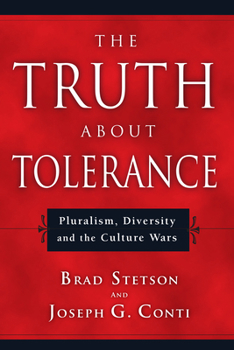The Truth About Tolerance: Pluralism, Diversity and the Culture Wars
Select Format
Select Condition 
Book Overview
Brad Stetson and Joseph G. Conti explore the use and misuse of the value of tolerance in academic circles and popular media, demonstrating that Christian conviction about religious truth provides the only secure basis for a tolerant society which promotes truth seeking.
Format:Paperback
Language:English
ISBN:0830827870
ISBN13:9780830827879
Release Date:February 2005
Publisher:IVP Academic
Length:207 Pages
Weight:0.70 lbs.
Dimensions:0.6" x 6.6" x 9.0"
Customer Reviews
3 ratings
Both Concise and Complete!
Published by Thriftbooks.com User , 16 years ago
Stetson and Conti succeed in producing a text that both adequately describes and succinctly encapsulates most important aspects of the history and boundaries of true tolerance. What passes for tolerance today, they argue, is not really tolerance in the classical sense, but a specific sort of ideological viewpoint which actively works to suppress rather than encourage discussion and diversity. It's a well-argued case in a great book, and I recommend it highly.
Biblical tolerance vs. Secular Tolerance
Published by Thriftbooks.com User , 17 years ago
What this book offers is a comprehensive evaluation regarding tolerance and how truth is determined from a biblical perspective. These authors examine pluralism and secular liberalism's effect on the individual Christian, and the Church as a whole. They get to the root source of popular culture's definition of tolerance and unity. They give extensive philosphical explanations and examples that help the reader understand the importance of the issues at stake.
The new tolerance is not worth tolerating
Published by Thriftbooks.com User , 18 years ago
This book is about how a good concept - tolerance - has been redefined and subverted by the secular left. Tolerance, properly understood, is a useful personal and social good. But stripped of its original meaning, it has become a weapon in the culture wars. Tolerance originally meant being able to respect a person while disagreeing with their ideas, beliefs or behaviors. Today it has come to mean accepting what your opponent says, believes or does. If someone today objects to something like abortion on demand or same-sex marriage, he or she is labeled as intolerant, bigoted and narrow-minded. Thus any person who now expresses an opinion or makes a moral critique which does not fit in with our politically correct culture is deemed to have committed the gravest of sins: being intolerant. But as the authors show, the ability to exercise moral discernment and make critical evaluations is at the heart of genuine democracy and the social good. By demanding conformity to the values regime of the secular left, the goal posts in value making have been shifted. The authors show that the new tolerance is closely aligned with moral relativism and the postmodern distrust of truth. But without true truth and moral absolutes, the entire concept of tolerance becomes meaningless. We can only tolerate something if we do not agree with it in the first place. We do not tolerate something we like or agree with. But if there is no absolute truth, and moral values are simple subjective preferences, then convictions and beliefs become mere preferences and tastes. No one needs to tolerate another person's preference for chocolate ice cream. No one needs to tolerate another person's taste for classical music. If all beliefs and moral claims are mere matters of choice and preference, then tolerance no longer is necessary. If we accept the postmodern belief that all truth is self-created, then no one has a right to challenge any belief, or make any moral judgment. In which case, we have nothing left to be tolerant of. Indeed, as the authors point out, the "belief in truth as subjectivity short-circuits discussion" and makes genuine social interaction impossible. Tolerance only functions in a setting where real dialogue, debate and intellectual sparring is allowed to take place. The authors show that the secular left has used the notion of tolerance to push their own agenda. The new relativists argue that believers who insist on moral values are being intolerant and exclusive, yet they demand a whole set of their own moral absolutes, be it the right to abortion, complete choice in all matters sexual, and so on. Thus in their appeal to moral relativism to silence the so-called religious right, they make their own appeal to fundamental moral values: tolerance, neutrality, pluralism, etc. They want to have their cake (there are no moral absolutes) and eat it too (their moral values should be absolutely adhered to). Moreover, tolerance itself is not an absolute There a






